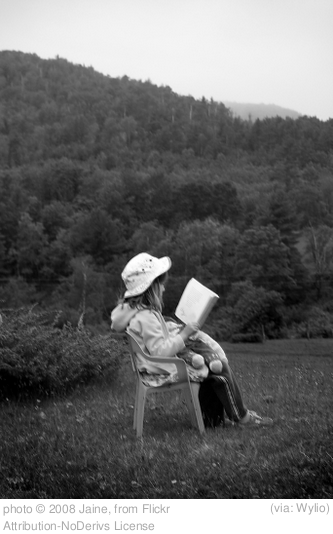“Early in our corruption we are taught that fiction is not true. Too many people apologize when they are caught enjoying a book of fiction; they are afraid that it will be considered a waste of time, and that they ought to be reading a biography or a book of information on how to pot plants. Is Jane Eyre not true? Did Conrad, turning to the writing of fiction in his sixties, not search there for truth? Was Melville, writing about the sea and the great conflict between a man and a whale, not delving for a deeper truth than we can find in any number of “how to” books?”
– Madeleine L’Engle’s Walking on Water
What truths have you learned from books or movies or television shows?


Fiction books are popular precisely because they DO ring true–if not with real life, then surely with real dreams. Whether The Chronicles of Narnia or The Great Gatsby or Puddin’ Head Wilson, I always see a new facet of myself and the world that I may not have encountered through non-fiction.
As someone who is highly intuitive, I engage the world through imagination even when I study science. In reading non-fiction, I might wonder what the right thing to do is. In reading fiction I discover, in fact, what I would do.
I love this quote, Shawn, precisely because I do think it’s so true. I learn a great deal about God and humanity from the Bible, but the purpose of that book is to tell us a specific story. It doesn’t tell us everything.
When I read Chaim Potok and see how Asher comes to terms with his art and his faith, that tells me truth that the Bible doesn’t speak to. I think God’s okay – actually I think God’s thrilled with that.
Love Chaim Potok!
Ah… but as Governor Pilate said (in the Bible), “What is truth?”
The LOTR series deeply impressed upon me the underlying truth of loyalty and perseverance.
Atwood’s “The Handmaid’s Tale” and McCarthy’s “The Road” remind me of the folly of man’s systems.
And anything by Christopher Buckley is guaranteed to point out truths we ignore with a sly satirical commentary.
Shawn, I’d be curious to hear your fiction preferences….
Thanks for your thoughts, Tor. My three favorite fiction books of all time are “East of Eden” by Steinbeck; “The Brothers K” by David James Duncan; and “A Prayer For Owen Meany” by John Irving.
Jesus said that he is Truth, so wherever we find truth–in fiction, music, or science, too–God is present (and arguably, even glorified.)
good art tells the truth, and so often it’s the truth our our brokenness. that’s where so much christian art falls flat–it tells part of the Truth of who Jesus is, but when it leaves out the broken parts and hard questions, it’s not really the whole truth.
i remember reading the sound and the fury in high school. it’s about the disintegration of a family, told in four parts by three brothers and their housekeeper. a lot of the story is about their sister but she never gets the chance to narrate. i feel like it taught me a lot of truth–about womanhood and the fact that one telling is rarely the whole story.
“so wherever we find truth — in fiction, music, or science, too — God is present (and arguably, even glorified.”
Beautiful! Thanks!
I think Finding Nemo is one of the best stories of the Gospel I’ve seen. It works on so many levels. And I pretty much cry through the whole thing. A father searches desperately for his lost son. A rebellious son learns real repentance. The power of redemptive community and sacrifice. I love it.
The Chronicles of Narnia is a goldmine, but from a very secular level, I’d say the movie, Taken. A rebellious child goes against her father’s wishes and chases after a life that she thinks will bring her joy. She is taken captive and faces all kinds of trouble because of her decision. The father loves his daughter and goes to extreme lengths of redeem her. *throat punch*
*kidney punch*
First of all, I’ve got to read Madeleine L’Engle — she’s been on my list forever…
Secondly, I love this quote, and I wholeheartedly agree. I think it was Henri Nouwen who said something like “your story is a universal story.” I can’t even begin to name the books that have had a profound influence on me. Virginia Woolfe’s “To the Lighthouse” is one I re-read every few years. What she has to say about marriage, human connection, humanity — everything — just blows me away. The older I get, the more relevant that book becomes.
Interesting, isnt’ it, how the older we get the more profoundly we are affected by “great” pieces of literature? Nothing about them goes away. That’s saying something.
G. K. Chesterton wrote of how fairy tales might be the truest things in “Orthodoxy.” Reminds me of the L’Engle quote. :)
I learned truths about relationships from the film “High Fidelity.” That it’s not about the fantasy – that the fantasy, in fact, is fundamentally unobtainable because it’s a fantasy. But the reality of a real relationship in all of its messiness, is much more interesting and worthwhile.
I learned the value of gentleness and stillness from the Innocence Mission.
I learned that God’s imagination must be huge simply because He created Bjork.
I learned that suffering could be a thing of value rather than a thing to be dismissed from Joshua Wolfe Shenk’s “Lincoln’s Melancholy.”
I learned that beauty is often intermingled with ugliness in P. T. Anderson’s “Magnolia,” and that film has continued to summarize so much for me about life, about people, about God, etc.